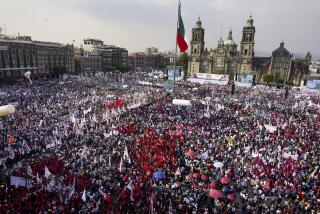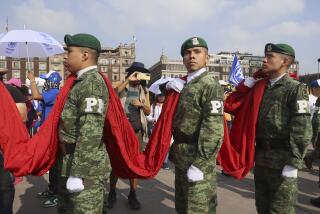Pinochet Nominated Amid Protests, Tear Gas in Chile
- Share via
SANTIAGO, Chile — Gen. Augusto Pinochet was nominated by the military Tuesday as the sole candidate in a presidential plebiscite, while a few blocks away hundreds of pro- and anti-Pinochet militants battled and riot police fired barrages of tear gas to break up protests.
From the moment President Pinochet entered the nominating session at the Defense Ministry to the cheers of about 2,000 supporters, demonstrations against him began in nearby shopping streets. An almost playful spirit prevailed initially, as protesters kicked soccer balls inscribed with Pinochet’s name and tossed bottle caps in the air--considered an obscene gesture here. Others burned Pinochet posters and chanted, “He is going to fall!”
Police showed considerable restraint at first but then began scattering several hundred increasingly vocal protesters and thousands of sympathizers in charges with tear gas-spraying trucks and water cannon. The conflict seesawed for several hours, with opposing forces fighting with fists and poles.
Local news reports said a teen-age boy was shot to death in the capital by gunmen from a passing car. At least 20 other people were reported injured. Police made 364 arrests in metropolitan Santiago, and unrest was reported in three provincial cities.
Pinochet, who took over in a 1973 coup, told the nation that he agreed to seek eight more years in power to consolidate what he called the restoration of stable democracy and the struggle against Marxist infiltration in Chile. Already the 72-year-old general has ruled longer than any Chilean president since the nation gained its independence from Spain in 1818.
If the “No” vote wins in the yes-or-no plebiscite scheduled Oct. 5, a multi-party presidential election open to candidates from all but Communist organizations would be held late next year. A coalition of 16 opposition parties, aligned in the No Command, claims a slight lead in most reliable opinion polls.
The No movement portrays the vote as a choice between Pinochet’s continued dictatorship, with its legacy of bloodshed and oppression, and a return to Chile’s democratic traditions and civil liberties.
The violence in several sections of Santiago during the day could play into the hands of Pinochet’s forces, who have argued that a No victory in the plebiscite would bring a return to the chaos of the rule of the late Marxist President Salvador Allende, who was deposed by Pinochet.
Vehicles Stoned
As organized protests tapered off, small groups of youths, described by Chilean journalists on the scene as leftists, began stoning police vehicles and attempting to barricade a main boulevard, Alameda Avenue.
When the conflict escalated on Alameda Avenue, a few youths threw rocks at police vans and tried to erect barricades. Several in those groups were seized by police and dragged into vans. But most protesters simply chanted and marched, scattering when the tear-gas vans and water cannon trucks raced down the sidewalks spewing fumes and stinging water.
Most of the conflict occurred near the Defense Ministry or the Diego Portales government office building, where Pinochet’s nomination was announced to the nation.
Near the building, named for the autocratic 19th-Century ruler whom Pinochet considers a role model, Pinochet supporters battled opponents as police officers struggled to separate the groups. The pro-Pinochet supporters were members of the Union of Democratic Independents, a fiercely loyal right-wing group formed earlier this year as a spinoff from the older National Renovation Party. The No Command has accused union members of breaking up peaceful opposition campaign activities in recent months.
Andres Zaldivar, vice president of the Christian Democratic Party and a senior No leader, appealed on radio to supporters of the No movement to refrain from taking part in violence.
“There are people who are interested in provocation, and the government is facilitating this conflict,” he said. “Don’t give Pinochet an opportunity to use these conflicts for propaganda.”
The dour Pinochet showed only the slightest hint of a smile when Adm. Jose Merino, commander of the navy, announced the unanimous nomination to a gathering of government officials, diplomats and invited guests. Air force Gen. Fernando Matthei and National Police Gen. Rodolfo Stange had joined Merino in voting for Pinochet in a brief meeting confirming what had been all but certain for months.
In his acceptance speech, Pinochet sought to seize the high ground as the defender of democracy, saying the government had restored order, free enterprise and private property rights, and “now we are beginning a new phase in our constitutional life.”
Merino said the armed forces had intervened in 1973 “to save the country from complete destruction . . . and to fight insidious Marxist infiltration.”
“Today,” he said, “Chile is the most admired country on the continent.”
Patricio Aylwin, leader of the No Command, said after the nomination was disclosed: “Once more, this government has opted for confrontation.” Aylwin charged that after 15 years in power, Pinochet has the mentality of a dictator: unlimited ambition, a record replete with human rights violations and a philosophy of “privilege for a few and humiliation for all the rest.”
The opposition daily Fortin Mapocho noted that Pinochet was nominated in the same room where the military junta suspended Congress, exiled dissidents to a remote island and enacted other severe measures in the days following the 1973 coup.
The day ended somewhat more festively, however. About 10,000 Pinochet followers assembled in front of the government palace for a brief address by Pinochet, followed by a thunderous display of fireworks above the square.
More to Read
Sign up for Essential California
The most important California stories and recommendations in your inbox every morning.
You may occasionally receive promotional content from the Los Angeles Times.













